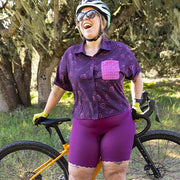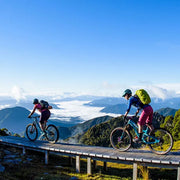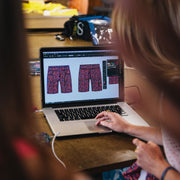Our friends behind the movie Afghan Cycles comprise of an amazing team of women who are personally, professionally, and publicly pedaling a revolution. Part of that revolution includes telling this beautiful story about women who were not born with the right to ride a bicycle. Below is short Q & A about the film. We hope you enjoy it and are inspired to watch Afghan Cycles and share it with your friends and family!
Tell us a little bit about the film.
Afghan Cycles is a film about women cycling in Afghanistan, and some of the many struggles that they face to do what they love. We use the bicycle as a lens for looking at women’s rights. It’s also a coming of age story. Having worked on this film since 2013 and having made strong connections with the women profiled, we get to follow along as they grow up from teenagers to young women.
Why do you think that bicycles are such a powerful tool for social justice, particularly women?
A bicycle means freedom of mobility, which is essential because it ensures things like access to education and healthcare. There are the obvious health benefits of riding, but there are also emotional benefits; I think we all know the sensation of feeling stronger and happier on a bicycle. It’s not that long ago that bicycles were instrumental in our own women’s movement. Suffragette Elizabeth Cady Stanton once said, “the bicycle will inspire women with more courage, self-respect, self-reliance…” I think that this still rings true today, no matter where you are in the world.

Women riding through Afghanistan
As women who ride bikes, what are some issues that you see here in the U.S. when it comes to gender equality?
In general, when it comes to mass media about places like Afghanistan, it’s easy to think “wow, the situation is so different over there.” That’s definitely true, but one of the things that has been so powerful in doing Q&A’s over the last year after screenings is that inevitably someone in the audience draws a parallel between the struggles that the women in Afghan Cycles face and their own. For example, we have had women talk about parents of young girls in their community aren’t allowed to ride because they think it’s unsafe. Or women have told us that they don’t like riding in cities because they feel unsafe because of a lack of infrastructure, or the fact that they get catcalled while riding. There is also a clear gender gap in the cycling industry as a whole. It’s good to remind ourselves that we have a lot of work to do here at home too, and it’s inspiring to see initiatives that are working hard to make the industry more inclusive.
What do you want people to take away from your film?
A woman a few weeks ago who saw our film at the Human Rights Watch festival in Amsterdam posted a picture on Twitter and said “In honour of Frozan and all the Afghan women who cycle, I went for my usual Sunday ride today, but this time with a new humility. I am in awe of their courage and sacrifice.” We love that people come away from the film with a new sense of inspiration and courage and that they use that to take action in big ways and in small. Above all, we hope that people will start to really see the bicycle as a tool for social justice. We’ve teamed up with World Bicycle Relief as a national partner to raise money for their initiatives (which people can also do by hosting an Afghan Cycles screening), since they too are committed to the idea that the bicycle is a vehicle for gender equity. To everyone out there who believes in the power of women and women’s voices: keep riding and keep inspiring each other!

Photo from Amsterdam
Where can we watch the film?
The film is available for purchase, rent, or stream here.






